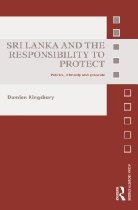Ilankai Tamil Sangam30th Year on the Web Association of Tamils of Sri Lanka in the USA |
|||
 Home Home Archives Archives |
Sri Lanka and the Responsibility to ProtectPolitics, Ethnicity and Genocideby Damien Murphy, Routledge, November 24, 2011
This book provides a study of the war by Liberation Tigers of Tamil Eelam (LTTE) to create a separate state in Sri Lanka. It examines the ways in which this war should, in principle, have invoked ‘Responsibility to Protect’ principles, as well as the political, legal and practical problems involved and, ultimately, why the international community failed to act. Over the years there have been several events, including those in Rwanda, Sierra Leone, Timor-Leste, Darfur, and Kosovo, that have led the international community to accept a responsibility to protect. However, despite its overwhelming preliminary endorsement, the principles of this concept are still not universally sanctioned and there are some strong international opponents, including some countries that were initial signatories of the convention. By considering the example of Sri Lanka, the text focuses on what conditions could satisfy or demand the application of responsibility to protect. It further presents a case as to why this conflict was, and may still be, the normative responsibility of the international community. Sri Lanka and the Responsibility to Protect will be of great interest to students of South-East Asian politics, human rights, international law, ethnic conflict, security studies and IR in general. Contents Introduction Product Details
About the Author Damien Kingsbury is Professor at the School of International and Political Studies, Deakin University, Melbourne. He is the author and editor of a number of books and numerous journal articles on political and security matters. See discussion of Saddam's anti-Kurd campaign described as genocide in "Genocide: An Comprehensive Introduction." |
||
|
|||
 Sri Lanka and the Responsibility to Protect: Politics, Ethnicity and Genocide (Asian Security Studies)
Sri Lanka and the Responsibility to Protect: Politics, Ethnicity and Genocide (Asian Security Studies)